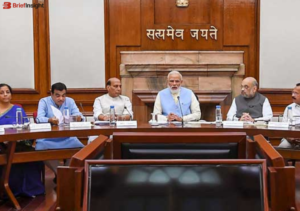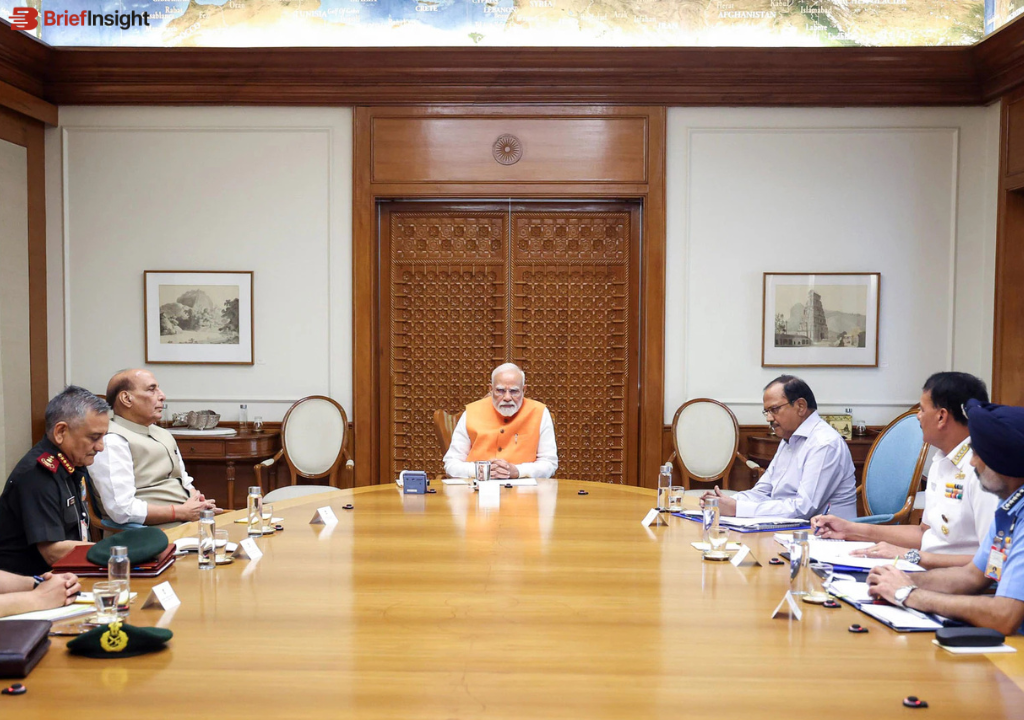In the aftermath of the brutal Pahalgam terror attack that left 26 civilians dead, Prime Minister Narendra Modi is set to chair a crucial meeting of the Cabinet Committee on Political Affairs (CCPA) today. The session comes days after a series of non-military measures were announced by India, and amid mounting expectations of a decisive response.
The PM Modi CCPA Pahalgam Attack meeting is being viewed as a turning point in India’s multi-layered strategy — one that could shape the diplomatic, economic, and potentially military contours of the nation’s next steps.
CCPA Meeting: Timing and Importance
This CCPA meeting is significant for several reasons. Not only does it follow the Cabinet Committee on Security (CCS) meet held earlier this week, but it also takes place at a moment of heightened national tension and international focus on South Asia.
The last time such a meeting was called under similar circumstances was in February 2019, in the wake of the Pulwama terror attack. That CCPA session laid the groundwork for revoking Pakistan’s Most Favoured Nation (MFN) status and indirectly preceded the Balakot air strikes.
Today’s session — as per reports — will likely address the political, diplomatic, and internal stability dimensions of India’s response to the Pahalgam massacre.
Backdrop: Non-Military Measures Already in Motion
After the initial CCS meeting, the Modi government had already taken a string of impactful decisions:
- Indefinite suspension of the Indus Waters Treaty,
- Revocation of all visas granted to Pakistani nationals,
- Closure of the Attari-Wagah border for civilian traffic and trade.
These steps were communicated as part of a broader non-military offensive, with the government signaling its resolve to isolate Pakistan economically and diplomatically on the global stage.
Today’s CCPA meet could refine these decisions or escalate India’s strategy, based on further assessment from the Ministries of Defence, Home, and External Affairs.
Links Suggested: Digital India and Cyber Security: Balancing Innovation and Protection
Military Decisions Underway: Complete Freedom to Armed Forces
Parallel to today’s high-level political consultation, PM Modi has already held closed-door sessions with:
- Defence Minister Rajnath Singh,
- National Security Advisor Ajit Doval, and
- Chief of Defence Staff General Anil Chauhan.
According to sources, PM Modi has granted the Indian armed forces complete freedom to decide:
- The timing of the response,
- The mode of action, and
- The targets to be engaged.
This authorization recalls the posture taken after Pulwama, where the military response was executed in a surprise, high-impact fashion. The PM Modi CCPA Pahalgam Attack meeting today could formalize the political framework around these military options.
CCPA’s Role: Why This Meeting Matters
The Cabinet Committee on Political Affairs (CCPA) is considered the highest decision-making body in the Indian cabinet hierarchy after the CCS. Often dubbed the “Super Cabinet,” the CCPA’s remit goes beyond defence to cover:
- Inter-state political coordination,
- Internal security matters,
- Economic policy with political implications,
- Emergency legislative strategy,
- Foreign policy decisions with political fallout.
In essence, the CCPA helps synchronize government response across ministries when a decision has domestic political or global diplomatic weight — exactly the situation India faces today.

Past Precedent: Pulwama to Balakot, What Happened Then?
The most recent case study for understanding the CCPA’s importance lies in the events of 2019:
- On February 14, 2019, 40 CRPF jawans were killed in Pulwama.
- The CCPA met within 48 hours to review internal political impact and relations with Pakistan.
- India revoked Pakistan’s MFN status — a powerful trade signal.
- On February 26, Indian Air Force jets struck Balakot, a known terror training hub inside Pakistan.
Today’s sequence of CCPA and CCS meetings appears to be mirroring that playbook — though the nature and scale of India’s retaliation remain confidential.
Links Suggested: Bhashini AI: Can India Create Its Own ChatGPT Alternative?
Who Sits on the CCPA Panel?
The Cabinet Committee on Political Affairs is chaired by Prime Minister Narendra Modi and includes some of the most senior and influential ministers in the Union government:
- Rajnath Singh – Defence
- Amit Shah – Home Affairs
- Nirmala Sitharaman – Finance
- Piyush Goyal – Commerce
- Nitin Gadkari – Road Transport
- JP Nadda – Health
- K Ram Mohan Naidu – Civil Aviation
- Jitan Ram Manjhi – MSME
- Sarbananda Sonowal – Ports and Shipping
- Bhupender Yadav – Environment
- Annapurna Devi – Women and Child Development
- Kiren Rijiju – Parliamentary Affairs
- G. Kishan Reddy – Coal and Culture
Allied parties’ cabinet ministers have also been invited to ensure broad political consensus.
Links Suggested: India-Bangladesh Relations: Why India Withdrew the Trans-Shipment Facility
What Could Be Discussed Today?
According to political observers, today’s CCPA agenda may include:
- Coordinating India’s diplomatic campaign at the United Nations and global forums.
- Laying out a Parliamentary strategy in anticipation of demands from the Opposition for a joint resolution.
- Reviewing the public and political mood nationwide, especially ahead of key elections in multiple states.
- Determining whether a further escalation in retaliation — including covert action — is politically viable.
- Evaluating how India’s foreign policy posture toward Pakistan, China, and Gulf countries may be impacted.
The CCPA’s outcome will shape not only India’s next tactical moves but its strategic tone for the months ahead.
Conclusion
As PM Modi chairs today’s CCPA meeting, the nation watches closely. With diplomatic, military, and economic levers already activated, the CCPA’s political direction will define India’s long-term message — to its own people, to adversaries, and to the international community.
In the shadow of the Pahalgam massacre, this meeting could mark the beginning of a new phase in India’s counterterror doctrine — one that blends political unity, calibrated retaliation, and strategic resolve. The stakes are high, and today’s decisions could echo far beyond South Asia.

